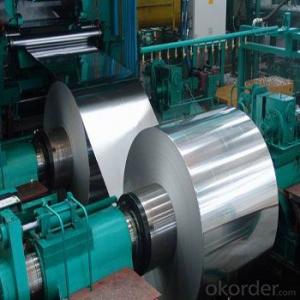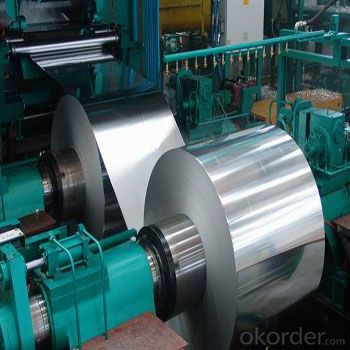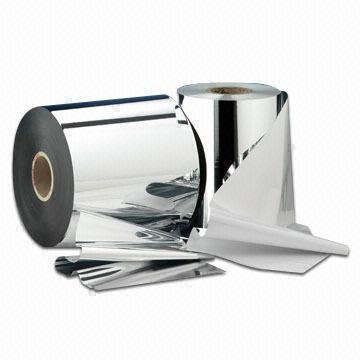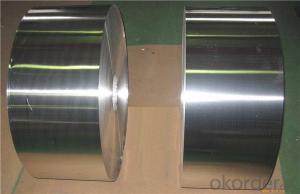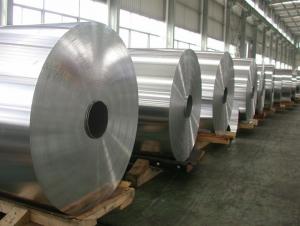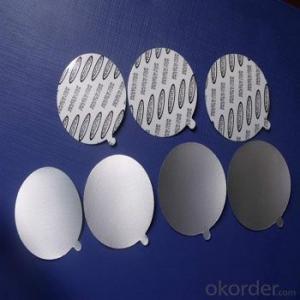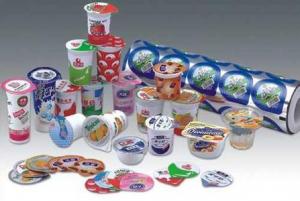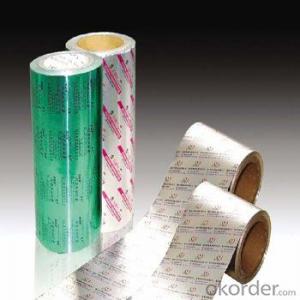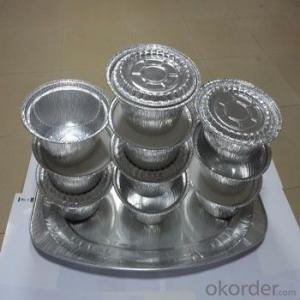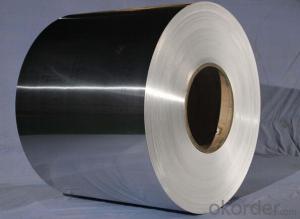3003 Aluminum Coil Rolls - Household Aluminum Foil and Strips
- Loading Port:
- Shanghai
- Payment Terms:
- TT OR LC
- Min Order Qty:
- 1000 m.t.
- Supply Capability:
- 1000 m.t./month
OKorder Service Pledge
OKorder Financial Service
You Might Also Like
Specification
1.20 years OEM service, custom order available
2.Excellent barrier
3.FDA, SGS
Material: Different materials available for option - Food grade
Glossy finish: PET/AL/PE, PET/VMPET/PE, OPP/VMPET/PE
Transparent: PET/PE, NY/PE,PET/CPP
Matte finish: OPP/AL/PE,PET/CPP, PET/NY/PE
More Details
1. Original factory price, high quality, fast delivery.
2. ISO9001:2008; ISO14001:2004.
3. Material: PET/ AL/ PE; NY/AL/PE,OPP/CPP,PE/PET.etc.
4.Moisture proof, oxygen barrier, nontoxic.
5. Available in different material to suit for different products’ package
6.Customized structures, size, styles are welcome.
In North America, aluminium foil is known as aluminum foil. It was popularized by Reynolds Metals, the leading manufacturer in North America. In the United Kingdom and United States it is, informally, widely called tin foil, for historical reasons (similar to how aluminum cans are often still called "tin cans").Metallised films are sometimes mistaken for aluminium foil, but are actually polymer films coated with a thin layer of aluminium. In Australia, aluminium foil is widely called alfoil.
Aluminium (or aluminum; see spelling differences) is a chemical element in the boron group with symbol Al and atomic number 13. It is a silvery white, soft, nonmagnetic, ductile metal. Aluminium is the third most abundant element (after oxygen and silicon), and the most abundant metal in the Earth's crust. It makes up about 8% by weight of the Earth's solid surface.
Aluminium metal is so chemically reactive that native specimens are rare and limited to extreme reducing environments. Instead, it is found combined in over 270 different minerals.The chief ore of aluminium is bauxite.
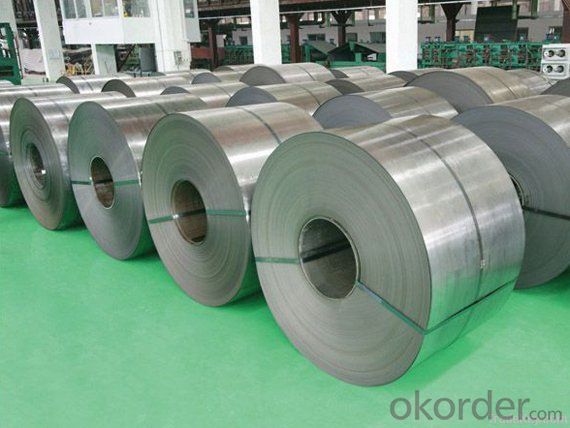
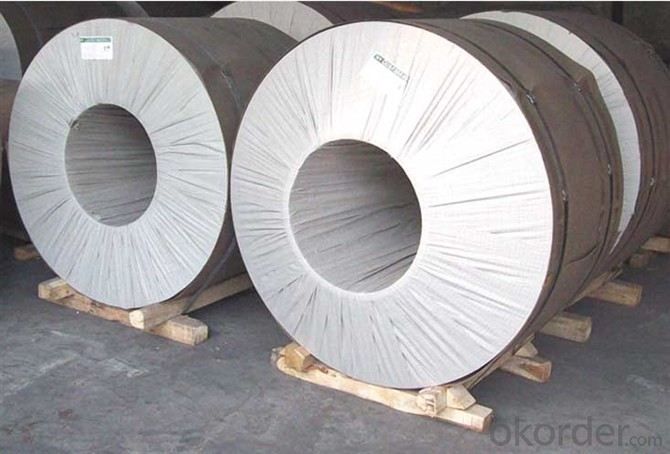
FAQ
①How about your company?
A world class manufacturer & supplier of castings forging in carbon steel and alloy steel,is one of the large-scale professional investment casting production bases in China,consisting of both casting foundry forging and machining factory. Annually more than 8000 tons Precision casting and forging parts are exported to markets in Europe
,America and Japan. OEM casting and forging service available according to customer’s requirements.
②How to guarantee the quality of the products?
We have established the international advanced quality management system,every link from raw material to final product we have strict quality test;We resolutely put an end to unqualified products flowing into the market. At the same time, we will provide necessary follow-up service assurance.
③How long can we receive the product after purchase?
The purchase of product within three working days, We will arrange the factory delivery as soon as possible. The pecific time of receiving is related to the state and position of customers.Commonly 7 to 10 working days can be served.
- Q: What are the production processes of aluminum coil and what are the functions of various industrial furnaces in the production of aluminum? The more detailed, the better. Thank you! Points!
- There are aluminum annealing furnace, aluminum alloy quenching furnace, aging furnace and smelting furnace.
- Q: How are aluminum coils protected against mechanical damage?
- Aluminum coils are protected against mechanical damage through various methods such as applying protective coatings, using durable outer casings, employing edge guards, and ensuring proper handling during transportation and installation.
- Q: Can aluminum coils be used in transformer windings?
- Yes, aluminum coils can be used in transformer windings. Aluminum is a commonly used material for transformer windings due to its low resistivity, high conductivity, and cost-effectiveness compared to copper. It offers several advantages such as lighter weight, better thermal conductivity, and lower manufacturing cost. However, there are some considerations when using aluminum coils in transformer windings, such as the need for larger cross-sectional area to compensate for its lower conductivity compared to copper. Additionally, special techniques may be required to prevent galvanic corrosion when aluminum is in contact with other metals in the transformer. Overall, aluminum coils can be a suitable alternative to copper coils in transformer windings, offering benefits in terms of efficiency and cost.
- Q: What are the common surface repair methods for aluminum coils?
- There are several common surface repair methods for aluminum coils. One of the most common methods is mechanical repair, which involves sanding or grinding the damaged area to remove any corrosion or imperfections. This is typically followed by using a filler or putty to smooth out the surface and create a seamless repair. Once the filler has dried, the repaired area can be sanded again to ensure a smooth finish. Another common method is chemical repair, which involves using specialized chemicals to remove oxidation or corrosion from the surface of the aluminum coil. This can be done by applying the chemical directly to the damaged area and allowing it to react with the surface, breaking down any corrosion or oxidation. Once the chemical has done its job, the coil can be rinsed and dried, and any remaining imperfections can be addressed with mechanical repair methods. In some cases, heat repair methods can be used to repair aluminum coils. This involves using a heat gun or torch to heat the damaged area, allowing the aluminum to become soft and pliable. Once the metal is heated, it can be reshaped or manipulated to remove any dents or deformations. This method requires careful control of the heat to avoid damaging the coil further. Lastly, anodizing is a common surface repair method for aluminum coils. Anodizing involves applying a protective coating to the surface of the coil, which not only repairs any damage but also provides added protection against future corrosion or oxidation. This method is often used for more extensive repairs or when the coil is exposed to harsh environments. Overall, the choice of surface repair method for aluminum coils depends on the extent of the damage and the desired outcome. It is always recommended to consult with a professional or follow manufacturer's guidelines to ensure the best results and prolong the lifespan of the coil.
- Q: Can aluminum coils be used in telecommunications infrastructure?
- Yes, aluminum coils can be used in telecommunications infrastructure. Aluminum is a lightweight and durable material that is commonly used in various industries, including telecommunications. The use of aluminum coils in telecommunications infrastructure offers several advantages. Firstly, aluminum is a cost-effective material compared to other metals like copper. It is readily available and has a lower price point, making it a preferred choice for many telecommunications companies. Additionally, aluminum coils are lighter in weight, which makes them easier to handle and install, reducing the overall labor and transportation costs. Moreover, aluminum has excellent electrical conductivity, making it suitable for transmitting data signals in telecommunications networks. Aluminum coils can effectively carry electrical current, ensuring efficient data transmission without any significant loss in quality. This conductivity enables reliable and high-speed communication over long distances. Another advantage of using aluminum coils in telecommunications infrastructure is their resistance to corrosion. Aluminum naturally forms a protective oxide layer when exposed to air, preventing it from rusting or corroding easily. This resistance to corrosion ensures the longevity and durability of the infrastructure, reducing maintenance and replacement costs over time. However, it is important to note that aluminum has a lower tensile strength compared to copper. Therefore, proper engineering and design considerations need to be taken to ensure the structural integrity of the infrastructure when using aluminum coils. Additionally, specific connectors and hardware compatible with aluminum may be required. In conclusion, aluminum coils can be effectively used in telecommunications infrastructure due to their cost-effectiveness, lightweight, electrical conductivity, and resistance to corrosion. Proper planning and design are necessary to ensure the successful implementation of aluminum coils in telecommunications networks.
- Q: What is the minimum order quantity for aluminum coils?
- The minimum order quantity for aluminum coils may differ based on the supplier and specific product requirements. Certain suppliers may set a minimum order quantity of one coil, whereas others may mandate several coils or even a full container load. To determine the minimum order quantity for aluminum coils, it is advisable to directly reach out to the supplier or manufacturer, as it can vary.
- Q: An they say aluminum can cause breast cancer in some.
- You bet it does......its a compound called aluminum chlorhydrate. Its made by reacting aluminum with hydrochloric acid. Actually they use aluminum hydroxide to prevent a potential explosion hazard during the manufacturing process. Aluminium-based complexes (chlorhydrates) react with the electrolytes in the sweat to form a gel plug in the duct of the sweat gland. The plugs prevent the gland from excreting liquid and are removed over time by the natural sloughing of the skin. The aluminum salts interact with the keratin fibrils in the sweat ducts and form a physical plug that prevents sweat from reaching the skin’s surface. Aluminum salts also have a slight astringent affect on the pores; causing them to contract, further preventing sweat from reaching the surface of the skin. The blockage of a large number of sweat glands reduces the amount of sweat produced in the underarms, though this may vary from person to person. Aluminum is considered a heavy metal and has been shown (in its elemental form only) to alter the physiology of the blood-brain barrier. Antiperspirants are considered drugs by the FDA and no test yet performed shows a link between Aluminum chlorhydrate and breast cancer, brain cancer or any other cancer for that matter. Hey, you asked......
- Q: im doing an a level physics presentation on aluminium and im trying to compare aluminium and copper in electricity pylons.i know that copper will have a better conductance than aluminium becasue it has a lower resitivity but i need to come up with a calculation to prove why aluminium is better for use in electricity pylons? i know its down to aluminium being more lightweight than copper and also much cheaper. But im not sure how to create an calculation to show this?:) any help is greatly appreciated
- Copper has lower resistance per unit volume, ie, a 1 cm diameter copper wire has less resistance than a 1 cm aluminum wire. BUT, aluminum is much lighter than Cu for the same diameter. If you used an aluminum wire that weighs the same as the 1 cm diameter copper wire, it would have LOWER resistance. And that is why aluminum is used in power transmission, and also in aircraft, where weight is important. to do this you calculate density resistivity which is (resistivity x density). Here is a partial table: Al 28.2e-9 Ω-m * 2700 kg/m? = 76e-6 Ω-kg/m? Cu 17.2e-9 Ω-m * 8960 kg/m? = 154e-6 Ω-kg/m? Ag 15.9e-9 Ω-m * 10500 kg/m? = 167e-6 Ω-kg/m? Au 22.14e-9 Ω-m * 19300 kg/m? = 427e-6 Ω-kg/m? Zn 68e-9 Ω-m * 7130 kg/m? = 485-6 Ω-kg/m? Fe 100e-9 Ω-m * 7870 kg/m? = 787e-6 Ω-kg/m? Note that Al is half that of Cu.
- Q: What are the different protective film options for aluminum coils?
- There are several protective film options available for aluminum coils, each offering specific benefits and suitability for different applications. Some common options include: 1. PVC (Polyvinyl Chloride) Film: PVC films are widely used for protecting aluminum coils due to their excellent resistance to moisture, chemicals, and abrasion. They provide a high level of surface protection and are available in various thicknesses and adhesive strengths. 2. PE (Polyethylene) Film: PE films are another popular choice for protecting aluminum coils. They offer good resistance to moisture and UV radiation and are generally more cost-effective than PVC films. PE films are available in different grades, including low-density polyethylene (LDPE) and linear low-density polyethylene (LLDPE). 3. PP (Polypropylene) Film: PP films are known for their excellent tear resistance and high tensile strength. They provide good protection against mechanical damage and are suitable for applications where coils may undergo rough handling or transportation. 4. PET (Polyethylene Terephthalate) Film: PET films offer outstanding clarity and transparency, making them ideal for applications where visual inspection of the coils is required. They also provide good resistance to heat, chemicals, and abrasion. 5. Adhesive Coatings: In addition to films, adhesive coatings are sometimes used to protect aluminum coils. These coatings are typically applied directly to the surface of the coil and form a protective layer against moisture, corrosion, and scratching. When selecting a protective film for aluminum coils, it is essential to consider factors such as the intended application, environmental conditions, handling processes, and desired level of protection. Consulting with a supplier or manufacturer can help determine the most suitable option for specific requirements.
- Q: What are the common quality control measures for aluminum coil manufacturing?
- There are several common quality control measures that are implemented in the aluminum coil manufacturing process to ensure the production of high-quality products. 1. Raw material inspection: The first step in quality control is to thoroughly inspect the raw materials, including the aluminum alloy used for the coil. This involves checking for any impurities or defects that could affect the final product. 2. Dimensional inspection: Throughout the manufacturing process, dimensional inspection is carried out to ensure that the aluminum coils meet the required specifications. This includes measuring the thickness, width, length, and diameter of the coils. 3. Surface inspection: The surface of the aluminum coils is inspected to detect any visual defects such as scratches, dents, or marks. This can be done visually or through the use of specialized equipment such as cameras or scanners. 4. Mechanical properties testing: Mechanical properties such as tensile strength, yield strength, elongation, and hardness are crucial in determining the quality of aluminum coils. Testing these properties ensures that the coils meet the necessary strength and performance requirements. 5. Chemical composition analysis: Aluminum alloys used for manufacturing coils must meet specific chemical composition standards. Regular analysis of the chemical composition is done to verify that the alloy meets these standards and to identify any deviations that may affect the quality of the final product. 6. Coating inspection: If the aluminum coils are coated or treated with a protective layer, the coating is inspected for uniformity, adhesion, and thickness. This ensures that the coils have proper corrosion resistance and aesthetic appearance. 7. Packaging inspection: Before the final products are shipped, packaging inspection is conducted to ensure that the coils are properly packed, labeled, and protected during transportation. This includes checking for any damage or contamination that may have occurred during the packaging process. Implementing these quality control measures helps to identify and rectify any defects or deviations in the manufacturing process, ensuring that the aluminum coils meet the required standards and customer expectations.
Send your message to us
3003 Aluminum Coil Rolls - Household Aluminum Foil and Strips
- Loading Port:
- Shanghai
- Payment Terms:
- TT OR LC
- Min Order Qty:
- 1000 m.t.
- Supply Capability:
- 1000 m.t./month
OKorder Service Pledge
OKorder Financial Service
Similar products
Hot products
Hot Searches
Related keywords
